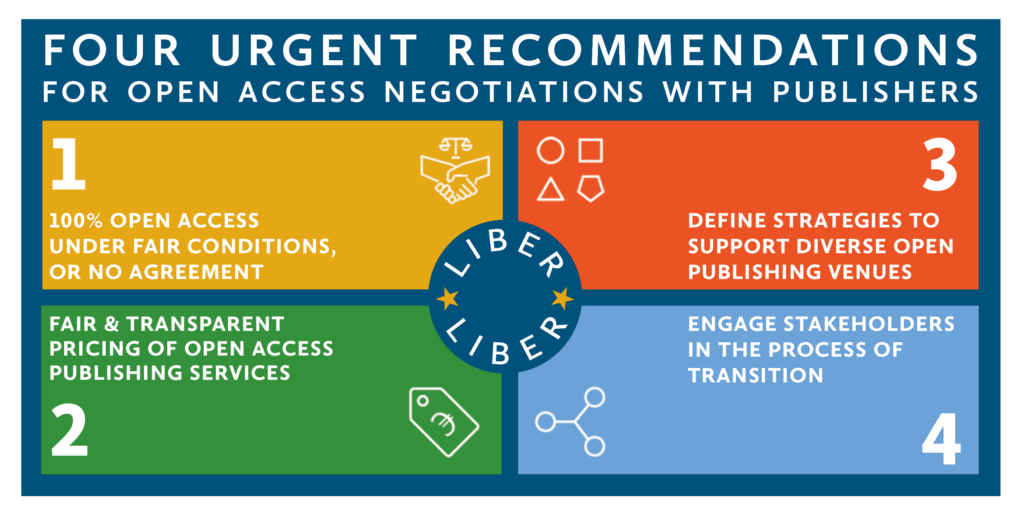Open Access Week 2022: Developing policies and practices for fully-open access landscapes – Update from the LIBER Open Access Working Group
A lot has happened with Open Access (OA) publishing in the past year. The LIBER Open Access Working group is dedicated to sharing insights and experiences to follow the latest developments towards the mainstreaming of fully OA publishing principles. To mark Open Access Week 2022, here are some of the latest updates from the OA field, and a look at what to expect from the Working Group in the coming months.
Transformative agreements as a vehicle for change
While transformative agreements (TAs) were first pioneered in Austria, the UK and the Netherlands, recently their uptake has grown across Europe and around the world. To date, more than 550 transformative agreements have been entered in the ESAC Registry, enabling authors in more than 70 countries to immediately publish their articles open access in the journal of their choice without having to pay APCs. TAs contribute to an exponential growth of OA content in otherwise subscription journal portfolios, and are playing an important role in helping countries achieve their national OA objectives. These trends can clearly be observed in the ESAC Market Watch which produces visualizations of data from the ESAC registry, including views of the OA status of publisher journal portfolios and the article output of corresponding authors in a number of countries where TAs are being implemented.
For institutions and library consortia that are just starting out in their TA strategies, the ESAC Initiative has produced a number of open community resources (developed with the participation of librarians and professionals from LIBER member libraries) including a collection of good practices on how to uncover institutional publishing profiles, produced by the ESAC Data Analytics Working Group, a reference guide to preparing, negotiating and implementing TAs, and a “How Transformative Is It? Spectrum”, to help institutions evaluate publisher proposals, assess the progress of their current TAs, and map out their next negotiation objectives.
Of course, TAs are just one component of broader OA strategies that include supporting diamond journals, fully OA journals, and advocating for rights retention, as outlined in the LIBER Four Urgent Recommendations for open access negotiations with publishers. By adopting a diversity of OA strategies, some countries have already achieved OA publication of nearly 100% of the results of their research outputs and are moving ahead with more expansive national open science strategies. For example, the Netherlands has recently launched its National Open Science Program with strategic milestones through to 2030.

New EU reforms for research assessment to boost open science
An agreement on reforming research assessment was officially opened for signatures during a plenary session at the European Research and Innovation Days in September this year. This is an annual flagship event to promote research and innovation hosted by the European Commission. The Agreement, which can be read in full on the CoARA (Coalition for Advancing Research Assessment) website, is built on the European Commission’s call for organisations to express their interest in being part of a coalition on reforming research assessment. 51 European organisations have declared their commitment to sign the Agreement and were announced as “early signatories” during the plenary session. The document elaborates on the principles, commitments, and timeframe for reforms and encourages building a coalition of organisations willing to work together in developing and implementing major changes in research assessment.
Global equity in OA publishing
The Open Access 2020 Initiative, together with partners including the African Association of Universities, cOAlition S, EIFL, the International Science Council, Science Europe and UNESCO are collaborating on a workshop series dedicated to practical mechanisms and action plans to remove barriers for readers and authors.
The workshop will be an opportunity for those who fund and produce research to explore immediate and long-term actions different stakeholders can take to ensure OA publishing is delivered in accordance with these principles:
- Fees associated with open access publishing services should be fair, reasonable, transparent, and globally equitable;
- Scholarly communication is part of the research process and, as such, costs for open access publishing services should ultimately be borne by research funders and institutions;
- Spending on scientific publishing should enable global open access by both readers and authors.
The first workshop, to be held online November 21 and 22, will feature viewpoints from Europe and Africa. Read more and register here.
Next activity of the LIBER Open Access Working Group
The LIBER Open Access Working Group will continue to work on disseminating knowledge and encourage discussion amongst the research library community by planning a workshop at the LIBER Winter Event in Amsterdam in December. The group aims to present insights on OA advancements and innovations and will, as always, make sure to include an interactive element where all workshop participants can share ideas and best practices. If you are a LIBER Member and are interested in attending the LIBER Winter Event, registrations are now open.
Authors: Maria Cassella and Colleen Campbell. With thanks to all members of the LIBER Open Access Working Group.